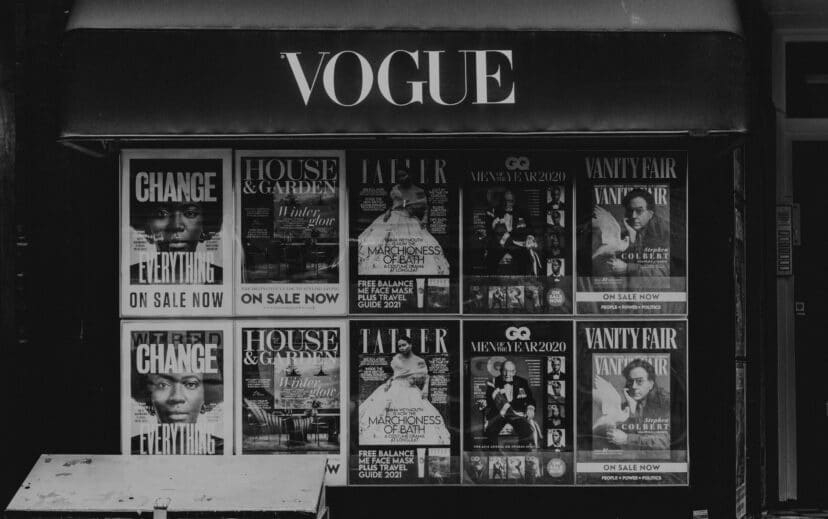In November 2022, Vogue Magazine publisher, Condé Nast, filed a lawsuit in New York federal court against renowned rap artists Drake and 21 Savage. The complaint alleges trademark infringement, counterfeiting, false advertising and other claims over the artists’ use of Vogue’s trademark in the promotion of their new joint album. The album, titled “Her Loss,” ran a promotional campaign involving an alleged counterfeit Vogue Magazine that depicted the two rappers featured on the cover. The campaign was posted on the rappers’ social media accounts and distributed as posters around major U.S. cities. Notably, in a social media caption, the rappers thanked Vogue Editor-in-Chief, Anna Wintour, for her love and support. Wintour has denied Vogue’s association with Drake and 21 Savage.
In its complaint, Condé Nast states that it sent Drake and 21 Savage a cease-and-desist letter and had repeatedly attempted to resolve the matter amicably. Condé Nast alleges that not only did the rappers ignore their demands, but also “doubled down” on sharing new displays of the promotional cover.
THE CORE OF THE VOGUE COMPLAINT
Condé Nast alleges federal claims of trademark infringement and counterfeiting, false designation of origin and unfair competition, trademark dilution, false advertising and similar state law claims. The main argument behind the complaint is that the rap artists’ promotional campaign is “deceptive” and “deliberately seeks to capitalize, and has capitalized, on the substantial goodwill and value associated with the VOGUE Mark to promote and drive up sales [of the album]…without Condé Nast’s authorization.”
Condé Nast claims that the release campaign was “built entirely” on the use of Vogue’s trademarks and the premise that Drake and 21 Savage would be featured on the cover of Vogue’s next issue. The publisher further claims that the rap duo “deliberately mimicked” promotional activities typically undertaken by Vogue in advance of the release of each of their issues. In addition, Condé Nast is claiming that there is evidence of actual confusion. Actual confusion goes beyond merely a “likelihood of confusion,” which is generally all that is required for successful trademark infringement claims. The publisher offers anecdotal evidence of several media outlets that had published stories stating that Drake and 21 Savage would be on the cover of Vogue, in addition to posts and comments made on social media by consumers and other celebrities.
In addition to a permanent injunction and destruction of all content, the publisher is seeking at least $4 million in damages.
WHAT VOGUE WILL NEED TO PROVE TO PREVAIL ON ITS CLAIMS
While there have been prior cases involving instances of albums being promoted through allegedly doctored magazine covers, this case appears to present new facts given the accompanying social posts and media coverage claiming that Drake and 21 Savage would be featured in the next issue of Vogue.
To prove trademark infringement under federal trademark law, Condé Nast must be able to show (1) that it owns the valid and legally protectable VOGUE mark, (2) that Drake and 21 Savage used the VOGUE mark in commerce without authorization in advertising their new album and (3) that the rappers’ use is likely to cause consumer confusion.
In determining whether a likelihood of consumer confusion exists in a trademark infringement case, New York Courts will look to the multi-factor Polaroid test established in Polaroid Corp. v. Polaroid Electronics Corp. (2d. Cir. 1961), which examines the (1) strength of the senior user’s mark; (2) degree of similarity between the two marks; (3) proximity of the products; (4) likelihood that the prior owner will bridge the gap; (5) actual confusion; (6) junior user’s good faith in adopting its own mark; (7) quality of defendant’s product; and (8) sophistication of buyers. The test is fact-specific and weighed in totality, meaning, while some factors may weigh more heavily than others, no one factor is dispositive of proving consumer confusion.
For its claim of false advertising, Condé Nast will need to show that Drake and 21 Savage used false or misleading words or descriptions in their commercial advertising to misrepresent the nature, characteristics or qualities of Vogue’s goods or services. Courts will also consider whether there was consumer deception and whether the deception was material in that it influenced consumer purchasing decisions. False advertising can be a form of “passing off” needed in a false designation of origin claim, since Drake and 21 Savage depicted Vogue’s products in advertisements for their own products.
VOGUE SUCCESSFULLY BLOCKS DRAKE AND 21 SAVAGE FROM USE (FOR NOW)
On November 9, 2022, just two days after Condé Nast filed its complaint, U.S. District Judge Jed S. Rakoff issued a temporary restraining order, blocking the rappers from using the fake Vogue cover in the album’s promotional campaign. Specifically, the order requires Drake and 21 Savage to stop distributing the counterfeit magazine and to stop posting the fake cover on social media. The rap duo was also blocked from using Anna Wintour’s name and likeness.
Judge Rakoff said that Condé Nast had demonstrated a “likelihood of success” on its claims of trademark infringement and false advertising. Further, he found sufficient evidence that consumer confusion existed, and that Condé Nast had suffered “irreparable harm.”
On November 22, 2022, the parties attended a subsequent hearing before Judge Rakoff to discuss a longer injunction. The hearing set dates in preparation for a jury trial in October 2023.
WHAT THIS CASE MEANS FOR ARTISTS AND TRADEMARK OWNERS
The lawsuit between Condé Nast (Vogue) and Drake, 21 Savage and Hiltzik Strategies (the artists’ PR firm) is ongoing, so we will be following along for updates on the case.
However, this early victory by Condé Nast indicates the strength of its arguments and serves as a warning to other artists who wish to use a brand’s trademarks in promoting their artistic content without authorization. Additionally, the case should remind trademark owners to conduct their due diligence in protecting their brand name and value, as a lack of brand protection can lead to a loss in value, reputation and profits. An experienced trademark attorney can help you with all aspects of trademark registration and litigation to ensure proper brand protection.




